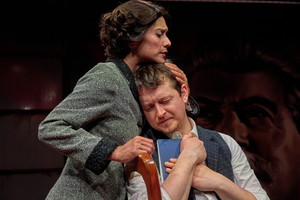Review: Washington Stage Guild's MEMOIRS OF A FORGOTTEN MAN a Timely Reflection on the Past

Occasionally you see a truly remarkable play that leaves you asking a lot of deep questions about yourself and your society. A play so timely, in fact, that you wonder whether the passage of time might blunt its impact.
If you're incredibly lucky, you find that the play can still pack a wallop, and leave you with more questions than before.
After a COVID-enforced hiatus, the Washington Stage Guild has finally had the opportunity to stage D. W. Gregory's searing study of innocence, hardened cynicism and totalitarian self-delusion, "Memoirs of a Forgotten Man." In spite of its long hiatus ("Memoirs" opened at the Contemporary American Theatre Festival in Shepherdstown, as part of a its 'Rolling World Premiere,' almost four years ago) the play continues to challenge us, throwing the mirror up to our flawed natures.
The play is inspired by a real-life case study of a Russian man born with hyperthymesia, a condition that gives you a vivid, total recall of everything from one's own birth to what you just said 2 minutes ago (if you've never heard of this look it up, it's a whopper). Given the harsh times in which this man lived-he spent his entire adult life under the thumb of the Soviet Union-Gregory poses the question: what might happen to a person with this remarkable faculty of recall, if they can't help but remember people the government wants to erase?
At the heart of the play is the memory man himself, Alexei, played here with exuberant charm by Chris Stinson; he opens the show, decked out in top hat and tails (thanks to Sígrid Jóhannesdóttir's costuming) performing as part of traveling circus; Russian words are scrawled at random on a chalkboard, and after a brief glance, he turns to the audience and recites every word, in order, top to bottom (he can do it bottom to top as well, if you like).
It's a clever way to introduce the problem at the heart of the play: memory, which we like to regard as precious, which we often wish we could capture forever, but which can be as treacherous and damning as it is uplifting.
We also meet a Soviet official, Kreplev (the commanding Steven Carpenter), sitting in his office in the late 1950's, shortly after Stalin's death and in the midst of a brief thaw in Soviet government repression. He cross-examines a psychologist, Natalya, who has recently submitted a paper for publication about Alexei. Her case study was based on interviews she conducted in the late 1930's, when Alexei first came to the attention of Soviet authorities. As Natalya, Lynette Rathnam makes a riveting debut with the Stage Guild. Tight-lipped, especially about her own ordeals under Stalin, Rathnam's Natalya has seen and suffered too much to trust anyone with the details of her work, let alone Kreplev.
One of the great tensions at the heart of the play is the secrets these two withhold from each other; discovering those secrets, acknowledging those painful memories to themselves and each other, is a dominant theme. Through a series of flashbacks-from Alexei's boyhood, through his brief career as a news reporter, and the night his family is betrayed-we see why both Natalya and Kreplev prefer to keep their memories to themselves.
In the end, Alexei is found-almost by chance-performing his memory act at a circus in a remote provincial town. After decades apart there is a attempted reunion, with results that in retrospect, given the times, could have been easily predicted. But that doesn't make the denouement less wrenching, and Carpenter's character is left, alone, pondering whether and how to remember. As are we all.
Kasi Campbell directs a tightly-rehearsed ensemble, who assume multiple roles in the course of the play-and Laura Giannarelli provides multiple vivid characters, helping to fill out the tragic story of the three central characters. One minute a haggard mother, the next an officious teacher or editor (same difference), she is also able to provide us with some welcome comic relief.
Scenic designer Joseph B. Musumeci, Jr., places a massive image of Josef Stalin's smiling, menacing face upstage, and it is Stalin's brutal purges of the 1930's that define the characters we see.
What made Stalin's dictatorship so appalling was that he wasn't satisfied to simply kill his enemies; their images were systematically erased from photographs, government documents, biographical dictionaries. He practiced the Communist, totalitarian version of the old Roman tradition of damnatio memoriae, in an attempt to pretend these people never existed. If you can find it there'a a photographic anti-journal, "The Commissar Vanishes," which documents some of the most outrageous omissions and deliberate distortions of Soviet history under Stalin, long before Photoshop.
We find ourselves, yet again, in an age where national memory is heavily disputed territory; can we blame people, for wishing to forget the unpleasant facts of the past? On the other hand, how on earth can we absolve them of things they pretend never happened? The struggle for memory, and the consequences of memory, is ongoing. Gregory shines a light on this struggle, subtly and brilliantly. The play may be set in the early 20th century, but if you change a name here or a town there, it becomes crystal clear that this play is about all of us.
Production Photo: Lynette Rathnam as Natalya and Chris Stinson as Alexei in Memoirs of a Forgotten Man by D.W. Gregory at Washington Stage Guild through May 29. Photo by DJ Corey Photography.
Performances of Memoirs of a Forgotten Man will be at the Undercroft Theatre, located in the basement of the Mount Vernon Place United Methodist Church, 900 Massachusetts Avenue, N.W., through Sunday, May 29.
For more information, call 202-900-8788, and for tickets visit:
https://stageguild.org/buy-tickets/
Reader Reviews

Videos

